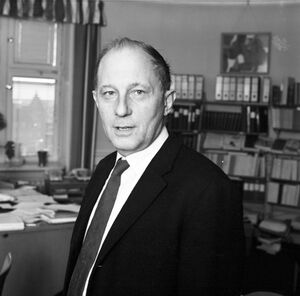Difference between revisions of "Clas-Erik Odhner"
m |
(unstub) |
||
| (One intermediate revision by one other user not shown) | |||
| Line 1: | Line 1: | ||
{{person | {{person | ||
|wikipedia=https://sv.wikipedia.org/wiki/Clas-Erik_Odhner | |wikipedia=https://sv.wikipedia.org/wiki/Clas-Erik_Odhner | ||
| − | | | + | |description=Economic researcher for the [[Swedish Trade Union Confederation]]. Attended the [[Bilderberg/1983|1983]] and [[Bilderberg/1984|1984]] Bilderberg meetings. |
| − | |image= | + | |image=Clas-Erik Odhner.jpg |
|nationality=Swedish | |nationality=Swedish | ||
|birth_date= 7 May 1921 | |birth_date= 7 May 1921 | ||
| Line 8: | Line 8: | ||
|death_date=30 November 1999 | |death_date=30 November 1999 | ||
|death_place=Täby, Sweden | |death_place=Täby, Sweden | ||
| − | |constitutes=agronomist | + | |constitutes=agronomist,economist |
}} | }} | ||
| + | '''Clas-Erik Teodor Odhner''' was a Swedish agronomist and economic researcher for the [[Swedish Trade Union Confederation]]. He attended the [[Bilderberg/1983|1983]] and [[Bilderberg/1984|1984]] Bilderberg meetings. | ||
| + | |||
| + | ==Early life== | ||
| + | Odhner was the son of the zoologist and professor [[Teodor Odhner]] and Ebba Nordenson. He graduated in [[agronomy]] in [[1947]] and became an agronomy licentiate in [[1953]]. | ||
| + | |||
| + | ==Career== | ||
| + | He was employed at the Ministry of Agriculture 1947–1949, became investigation secretary at the [[Swedish Trade Union Confederation]] (LO), which was very powerful during the decades of ]]Swedish Social Democratic Party|Social Democratic Party government, in [[1950]] and head of LO's research department in 1966. | ||
| + | |||
| + | He is one of the originators of the EFO model, which was used to explain the relationship between wage formation and [[inflation]] in Sweden. According to the model, the economy was divided into two sectors, the sector exposed to international competition; and the rest, protected from international competition, e.g. many service companies and public service.<ref>https://sv.wikipedia.org/wiki/EFO-modellen</ref> | ||
| + | |||
| + | He was on the board of the state railway company SJ, and the third world development organization [[SIDA]].<ref>http://runeberg.org/vemardet/1969/0747.html</ref> | ||
| + | |||
| + | |||
{{SMWDocs}} | {{SMWDocs}} | ||
==References== | ==References== | ||
{{reflist}} | {{reflist}} | ||
| − | |||
Latest revision as of 22:46, 26 October 2022
(agronomist, economist) | |
|---|---|
 | |
| Born | 7 May 1921 Stockholm, Sweden |
| Died | 30 November 1999 (Age 78) Täby, Sweden |
| Nationality | Swedish |
Economic researcher for the Swedish Trade Union Confederation. Attended the 1983 and 1984 Bilderberg meetings. | |
Clas-Erik Teodor Odhner was a Swedish agronomist and economic researcher for the Swedish Trade Union Confederation. He attended the 1983 and 1984 Bilderberg meetings.
Early life
Odhner was the son of the zoologist and professor Teodor Odhner and Ebba Nordenson. He graduated in agronomy in 1947 and became an agronomy licentiate in 1953.
Career
He was employed at the Ministry of Agriculture 1947–1949, became investigation secretary at the Swedish Trade Union Confederation (LO), which was very powerful during the decades of ]]Swedish Social Democratic Party|Social Democratic Party government, in 1950 and head of LO's research department in 1966.
He is one of the originators of the EFO model, which was used to explain the relationship between wage formation and inflation in Sweden. According to the model, the economy was divided into two sectors, the sector exposed to international competition; and the rest, protected from international competition, e.g. many service companies and public service.[1]
He was on the board of the state railway company SJ, and the third world development organization SIDA.[2]
Events Participated in
| Event | Start | End | Location(s) | Description |
|---|---|---|---|---|
| Bilderberg/1983 | 13 May 1983 | 15 May 1983 | Canada Quebec Château Montebello | The 31st Bilderberg, held in Canada |
| Bilderberg/1984 | 11 May 1984 | 13 May 1984 | Sweden Saltsjöbaden | The 32nd Bilderberg, held in Sweden |